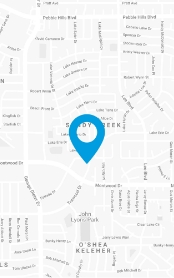Cataract Surgery

At LASIK, Cornea & Cataract Specialty Center, we specialize in restoring vision for patients with cataracts. If you are seeking cataract surgery in El Paso, Texas, our highly experienced cataract surgeons, Dr. Mario Di Pascuale and Dr. Austin Ellyson, can explain your treatment options and create a surgical plan tailored to your needs.
What Are Cataracts?
A cataract is a cloudy area in the lens of the eye that affects vision, and occurs as a natural part of aging. A healthy lens is clear, but as a cataract develops, the lens of the eye gradually becomes hard and clouded due to protein buildup. This allows less light to pass through to the retina at the back of the eye, and creates vision problems that make it more difficult to see clearly.
Types of Cataracts
Cataracts are almost always age related, although they can also occur due to trauma or in rare cases in which babies are born with congenital cataracts. Eye doctors classify age-related cataracts according to where they form in relation to the lens:
- Nuclear cataract: these common cataracts form in the center of the lens.
- Posterior subcapsular cataract: occur when an area in front of the lens capsule becomes cloudy.
- Cortical cataract: develop on the outer edge of the lens.
Symptoms of Cataracts
Vision changes due to cataracts are often gradual. You may find yourself changing your eyeglasses prescription and more progressive
Trusted Source
Cataracts
Cleveland Clinic
Go to Source
symptoms include:
- Clouded, blurred, or foggy vision
- Light sensitivity
- Difficulty seeing at night
- Double vision
- Colors are dulled

What Causes Cataracts?
Cataracts are a common part of the aging process. The risk of cataracts increases each decade after a person turns 40 and more than half of all Americans will have a cataract by the
Trusted Source
Cataract Tables
National Eye Institute
Go to Source
age of 75.
Risk Factors for Cataracts
While cataracts can happen to anyone, there are certain health conditions and lifestyle factors that may
Trusted Source
Cataracts
Mayo Clinic
Go to Source
increase your risk
of developing a cataract:
- Smoking
- High blood pressure
- Diabetes
- Excessive and unprotected exposure to sunlight
- A previous eye injury
- Ongoing use of certain medications, including corticosteroids
How Are Cataracts Treated?
In order to restore vision and prevent vision loss, cataract surgery must be performed to remove the cataract and replace the clouded lens with an artificial lens implant called an intraocular lens (IOL). Cataracts are progressive and in the early stages you may find some relief from vision changes by increasing your prescription or using brighter lights. However, as the cataract worsens so will your vision—cataracts can eventually lead to blindness if left untreated. Fortunately, cataract surgery is among the most commonly performed surgeries in the United States and it is widely considered to be one of the
Trusted Source
How Safe is Cataract Surgery?
All About Vision
Go to Source
safest procedures.
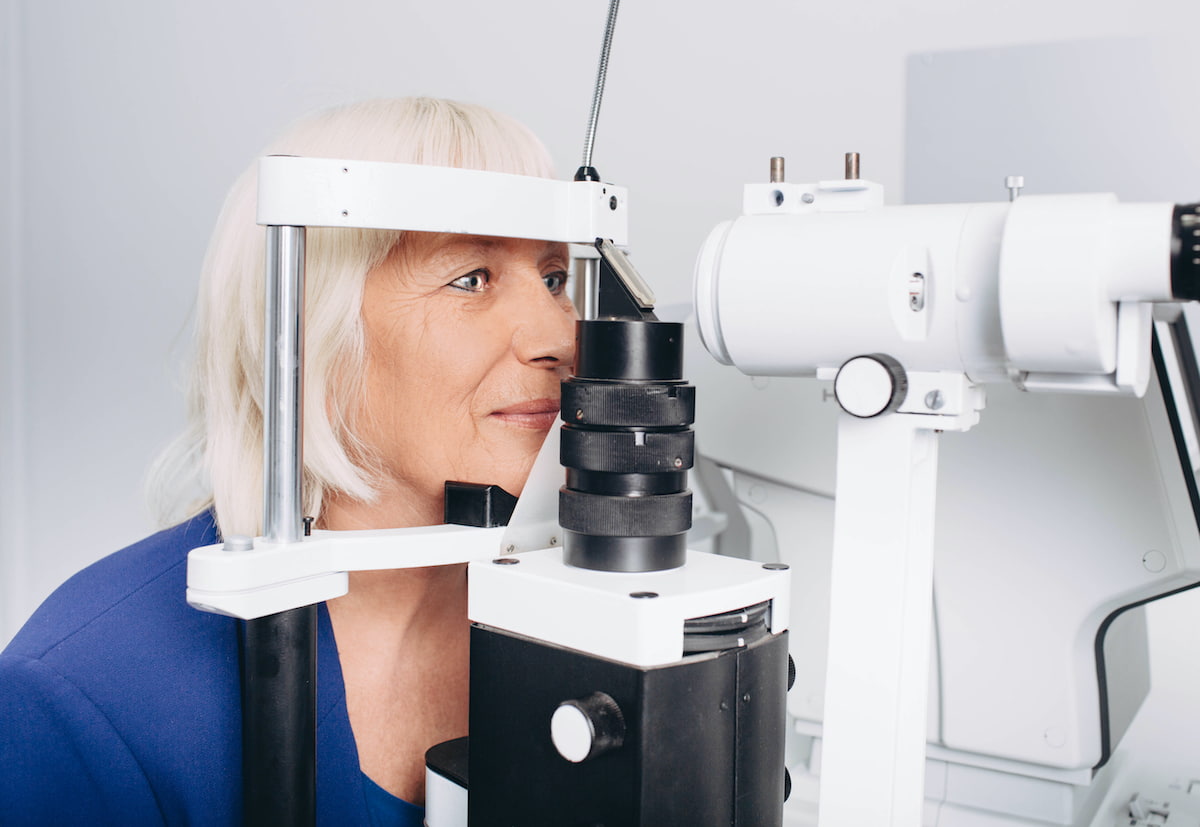
When is it Time for Cataract Surgery?
Cataract surgery is necessary once vision changes due to the clouding of the lens begin to prevent you from enjoying your daily activities. If you’re having trouble reading, watching TV, or driving, it is time to talk to your eye doctor about cataract surgery. Many cataract surgery candidates are pleased to learn that advanced IOL options may allow them to improve their vision so it is even better than it was before cataracts!

How Does Cataract Surgery Work?
Cataract surgery restores vision by replacing the eye’s cloudy lens with a prescription IOL.
Preparing for Cataract Surgery
The first step is a consultation appointment with one of our experienced cataract surgeons to make sure that cataract surgery is right for you. Once your surgery is scheduled, you will be given pre-surgical guidelines. It is very important to follow all of your surgeon’s instructions, which will include discontinuing blood thinning medications prior to surgery.
What to Expect During Cataract Surgery
Cataract surgery is a relatively quick, outpatient procedure. Your eye will be numbed with anesthetic eye drops and you will be offered a mild oral sedative medication to help you stay comfortable during the procedure. Your surgeon will make a very small incision along the side of your cornea and then remove the clouded lens. Your surgeon will then place your IOL behind the iris of your eye. No sutures are needed. If you require cataract surgery in both eyes, they will be treated on separate days spaced one to two weeks apart.
Recovery After Cataract Surgery
You will need a friend or family member to drive you home after surgery. You will be provided with an eye shield to protect your eye while it heals and you will need to wear that while you sleep for several days after surgery. You will be given detailed instructions for your recovery, including an eye drop schedule and information on follow-up visits. You should plan to avoid heavy lifting (anything over 5lbs) or strenuous exercise for one week after surgery. You will also need to avoid getting soap or water around your eyes for several days.
Bladeless Cataract Surgery
At LASIK, Cornea & Cataract Specialty Center, we offer laser-assisted cataract surgery using the Ziemer® femtosecond Laser System. We primarily utilize the Ziemer to treat patients with astigmatism using limbal relaxing incisions, which allow light to pass through the eye in a way that corrects vision that is blurred by astigmatism. This technology allows us to deliver the best possible cataract surgery results. Extensive eye measurements, taken before surgery, assist the doctor in delivering a completely customized treatment for each individual eye.
ZEPTO® Assisted Cataract Surgery
As part of our commitment to providing the best possible vision care, we have invested in advanced technology for cataract surgery. The ZEPTO System for Assisted Cataract Surgery is an innovative laser that allows our surgeon to perform the capsulotomy portion of cataract surgery with an incredible level of precision. This allows for an optimal surgical experience and accurate vision correction.
Intraocular Lens (IOL) Options for Cataract Surgery
There are several different types of IOLs and your cataract surgeon will advise you on which may be best for you depending on your lifestyle vision needs.
- Monofocal IOLs, sometimes called standard or traditional lenses, have one point of focus, either distance or close up. Most patients with monofocal lenses correct for distance vision and continue to use glasses for other distances or to treat astigmatism.
- Toric IOLs are designed to correct astigmatism, potentially reducing the need for glasses. Monofocal toric lenses are available, as well as multifocal toric lenses that can significantly reduce the need for glasses after surgery.
- Presbyopia-Correcting or Multifocal IOLs provide two or more points of focus and are designed to reduce the dependence on reading glasses as a result of presbyopia. This category of lenses offer the greatest chance at eliminating the need for corrective eyewear at all distances after cataract surgery.
- Light Adjustable Lens™ from RxSight® is the only IOL that can be prescription-adjusted after cataract surgery for precise vision correction. This unique lens can correct a range of vision issues and your doctor can fine-tune your prescription with a series of non-invasive light treatments after surgery.

Am I a Candidate for Cataract Surgery?
If you have been diagnosed with cataracts, you are likely a candidate for cataract surgery. The average age for cataract surgery is
Trusted Source
Geographic Variation in the Rate and Timing of Cataract Surgery Among US Communities
Kauh CY, Blachley TS, Lichter PR, Lee PP, Stein JD
Go to Source
67 years old
, but some people require surgery earlier or do not need surgery until later in life.
Hear from our patients!
Frequently Asked Questions About Cataract Surgery
Can I Prevent Cataracts?
No, there is no way to prevent cataracts; eye exercises, vision supplements or glasses will not prevent you from developing them. However, you may reduce your risk of early cataracts or other eye diseases by wearing UV protective sunglasses, not smoking, and eating a nutritious diet.
Are there any non-surgical treatments for cataracts?
No, surgery is the only effective and permanent treatment for cataracts.
What are the potential risks of cataract surgery?
Any surgical procedure carries some risk of side effects or complications. However, cataract surgery is one of the safest and most commonly performed medical procedures. Your surgeon will review possible risks, such as infection or inflammation, with you prior to surgery.
How Long Does Cataract Surgery Take?
The actual surgery typically takes about 15 minutes, but you can expect to be at the surgical center on surgery day for several hours.
How Long Does it Take to Recover From Cataract Surgery?
Most patients experience improved vision in as little as 24 to 48 hours and are able to resume many day-to-day activities within a few days of surgery. Your individual experience may vary; full recovery may take up to a few weeks, but you can increase your chances of a speedy recovery by closely adhering to all of your surgeon’s post-operative instructions. We will monitor your healing and discuss your recovery timeline at your follow-up appointment.
Can cataracts grow back?
No, cataracts cannot grow back once they are removed and your natural lens is replaced with a new lens. However, some patients do develop an eye condition called posterior capsule opacification, or PCO, after cataract surgery. Commonly called secondary cataracts, this condition can cause cataract-like symptoms. It does not typically require surgery and it is easily treated in a quick, in-office procedure with a yag laser capsulotomy.
How much does cataract surgery cost?
Health insurance typically covers cataract surgery as long as it is considered medically necessary. Your out-of-pocket costs may vary depending on your insurance plan and your IOL selection. Most insurance plans, including medicare, cover the cost of a monofocal IOL, but laser cataract surgery for astigmatism correction and advanced IOLs are considered elective upgrades and will be an additional cost. Our team is committed to making advanced IOL and laser technology as accessible as possible. We offer affordable financing options to help you get the surgery that best suits your needs and also fits your budget.
Treating Families - Not Just Their Conditions
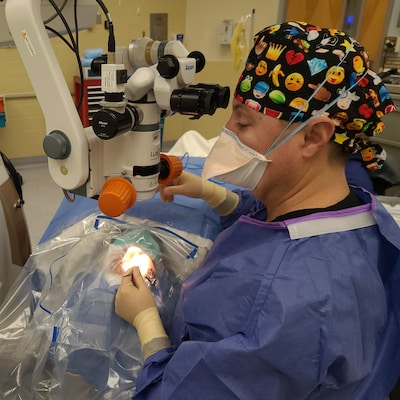
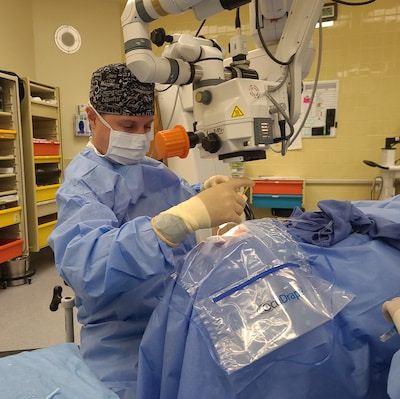
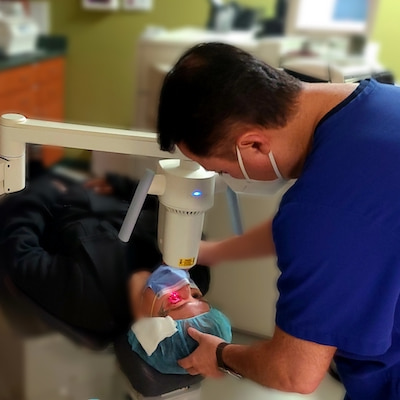
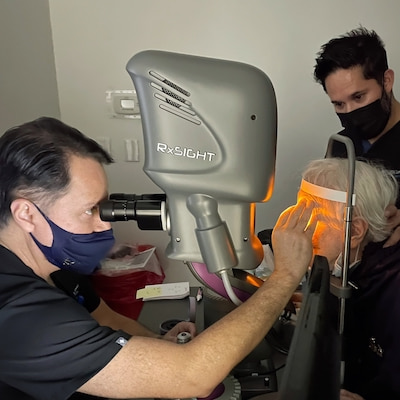
1Cleveland Clinic. Cataracts. Available: https://my.clevelandclinic.org/health/diseases/8589-cataracts Accessed March 24, 2022
2 National Eye Institute. Cataract Tables. Available: https://www.nei.nih.gov/learn-about-eye-health/outreach-campaigns-and-resources/eye-health-data-and-statistics/cataract-data-and-statistics/cataract-tables Accessed March 24, 2022
3Mayo Clinic. Cataracts. Available: https://www.mayoclinic.org/diseases-conditions/cataracts/symptoms-causes/syc-20353790 Accessed March 24, 2022
4 All About Vision. How Safe is Cataract Surgery? Available: https://www.allaboutvision.com/conditions/cataracts/faq-is-cataract-surgery-safe/ Accessed March 24, 2022
5Kauh CY, Blachley TS, Lichter PR, Lee PP, Stein JD. Geographic Variation in the Rate and Timing of Cataract Surgery Among US Communities.

